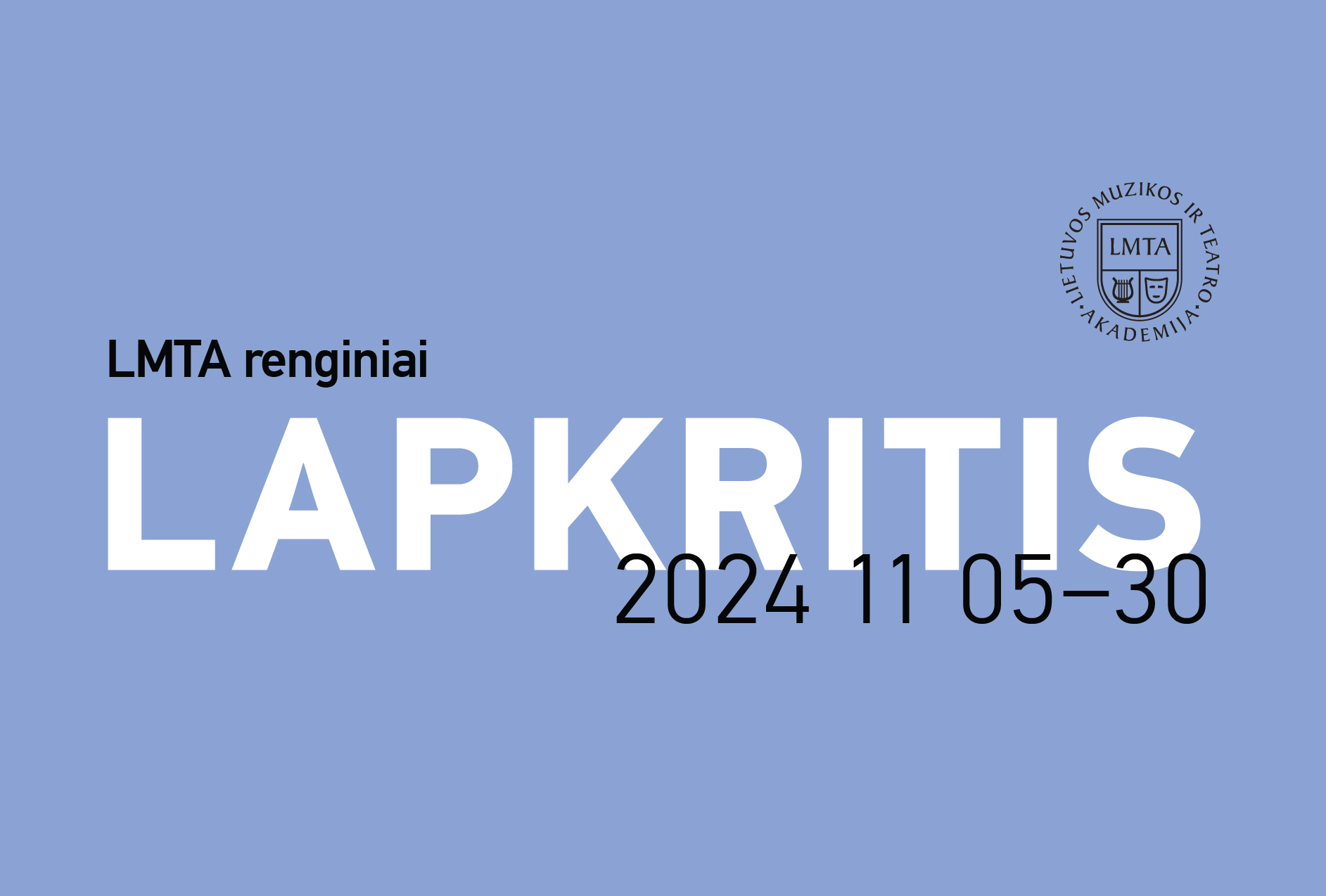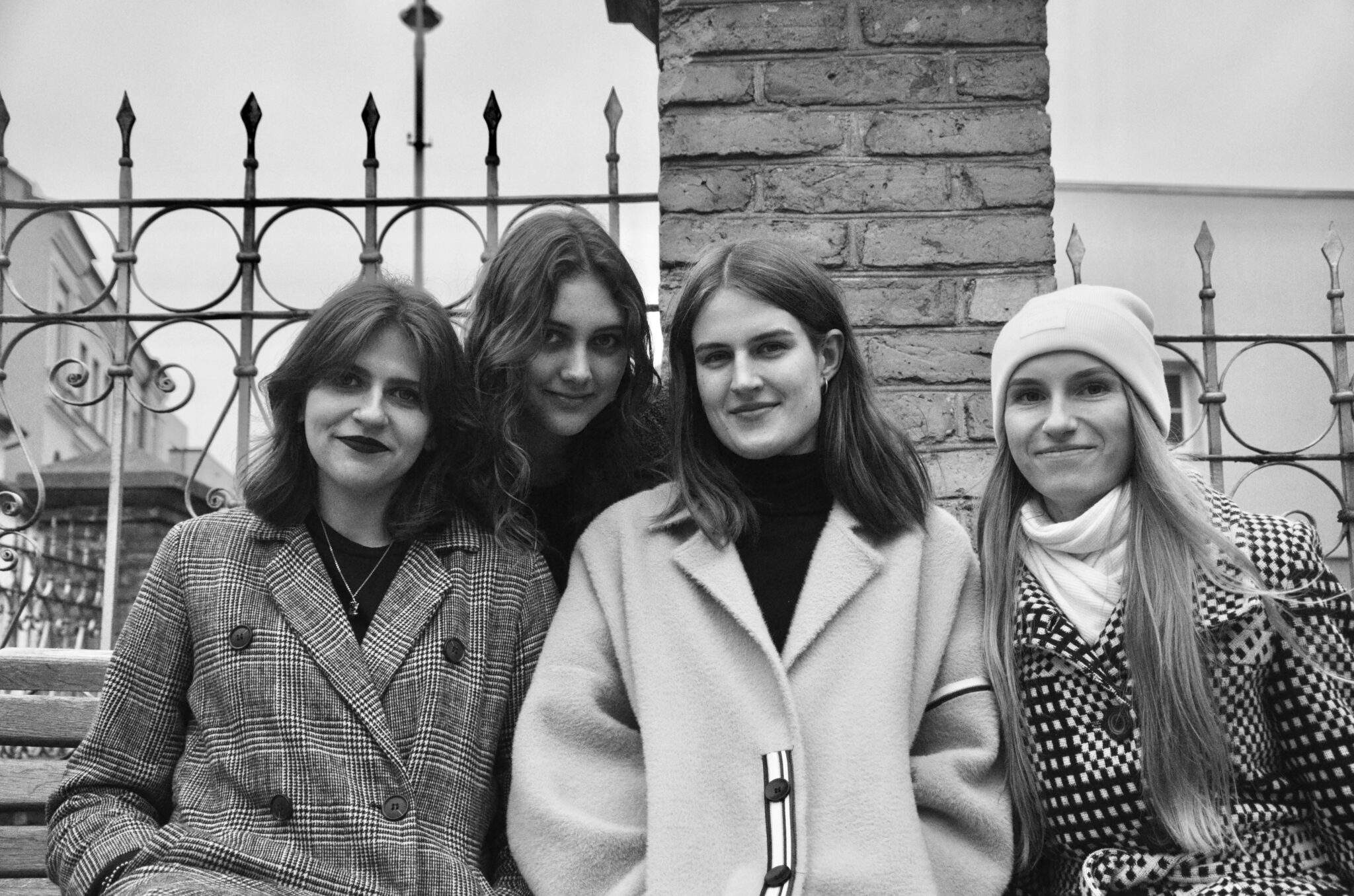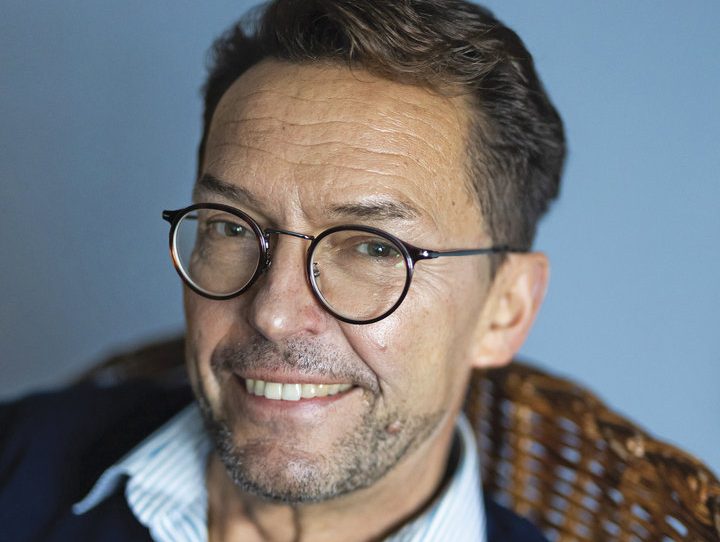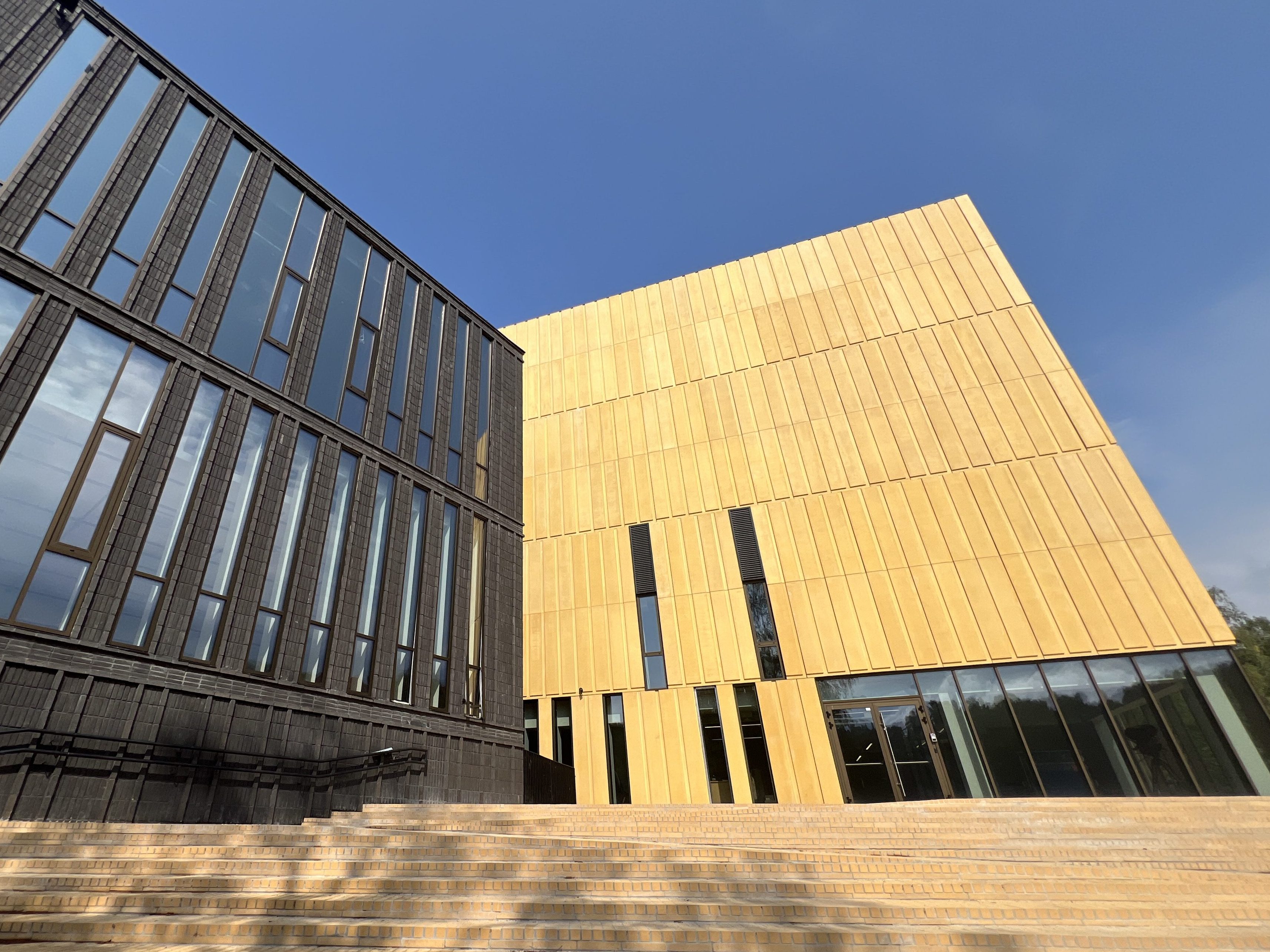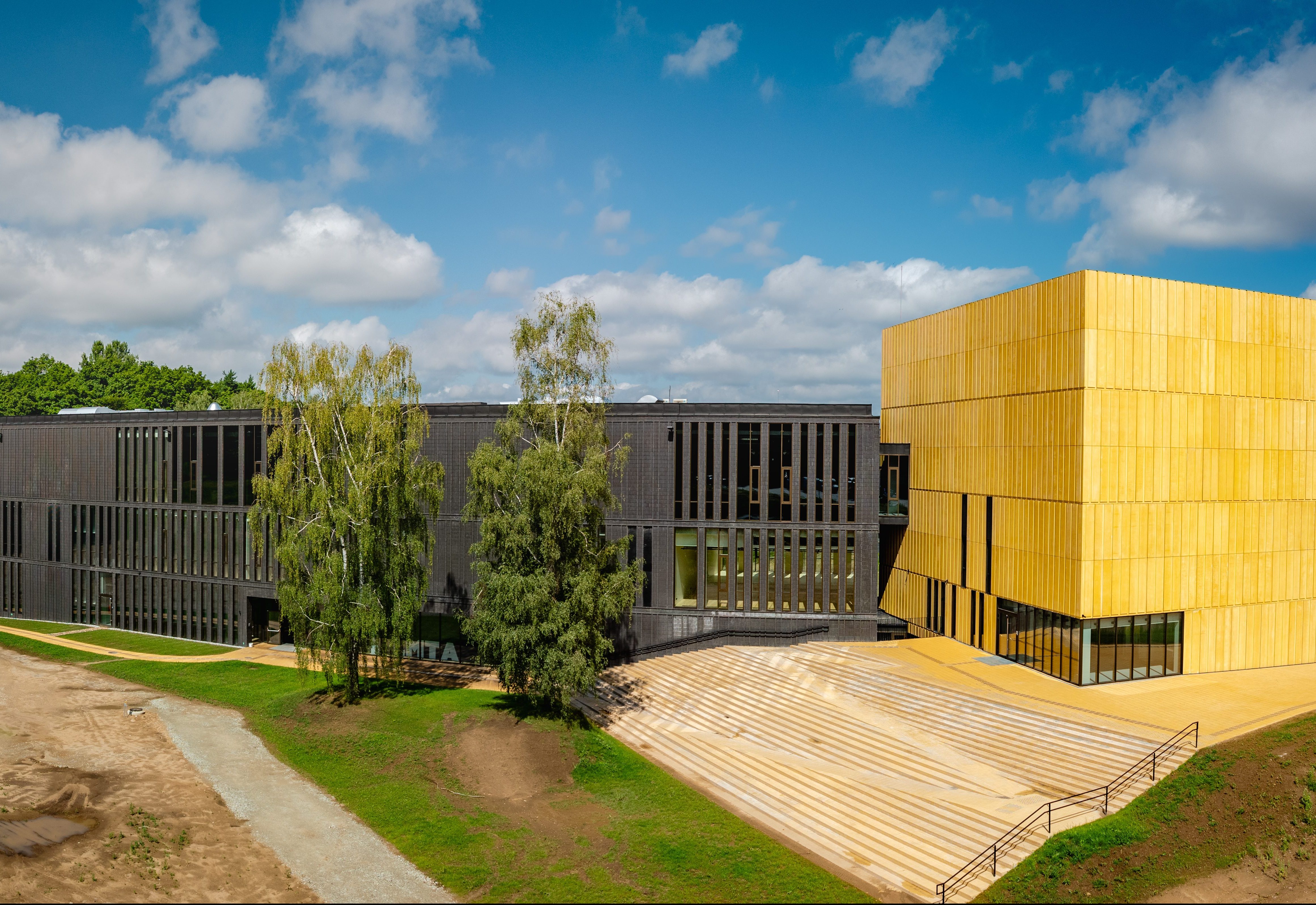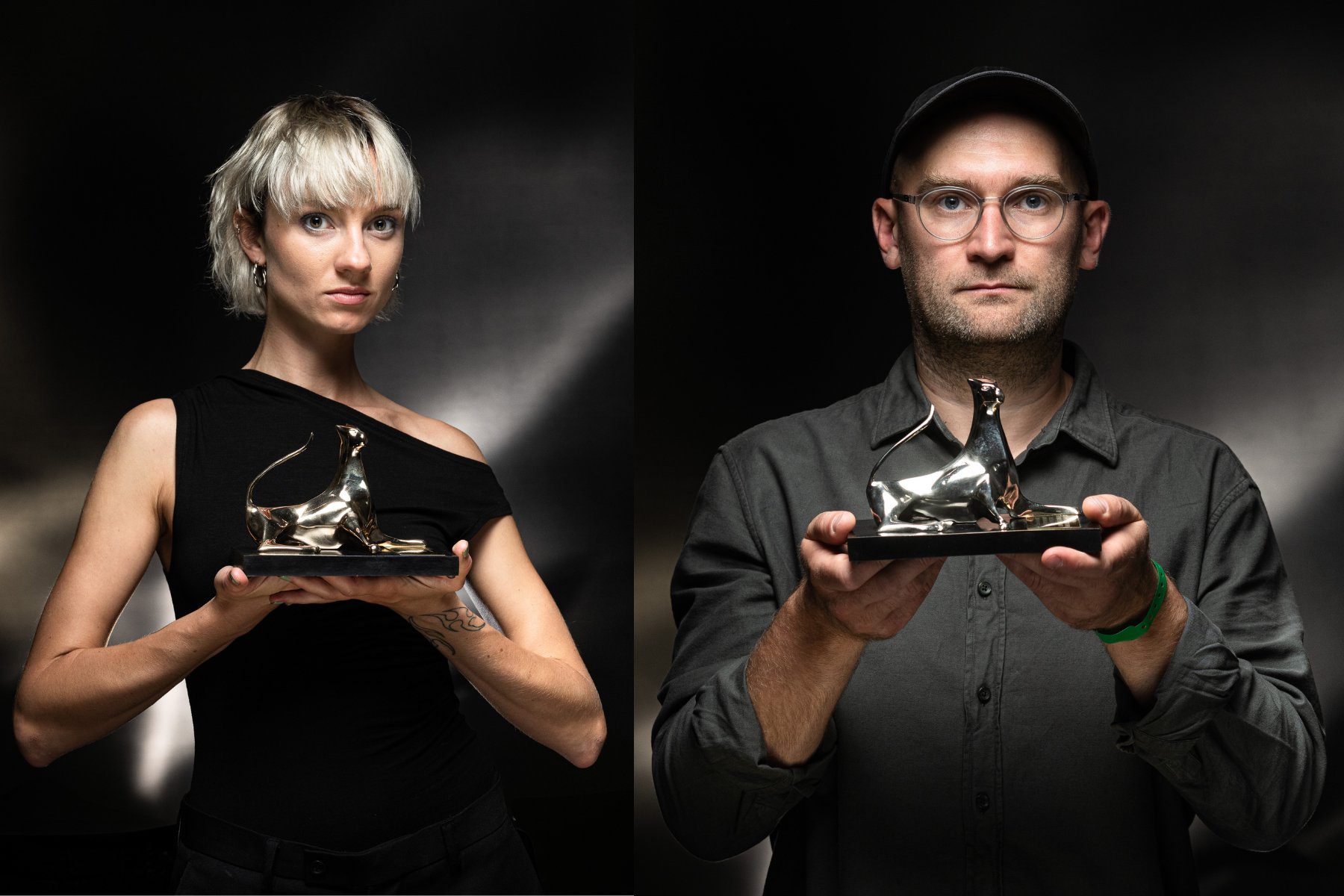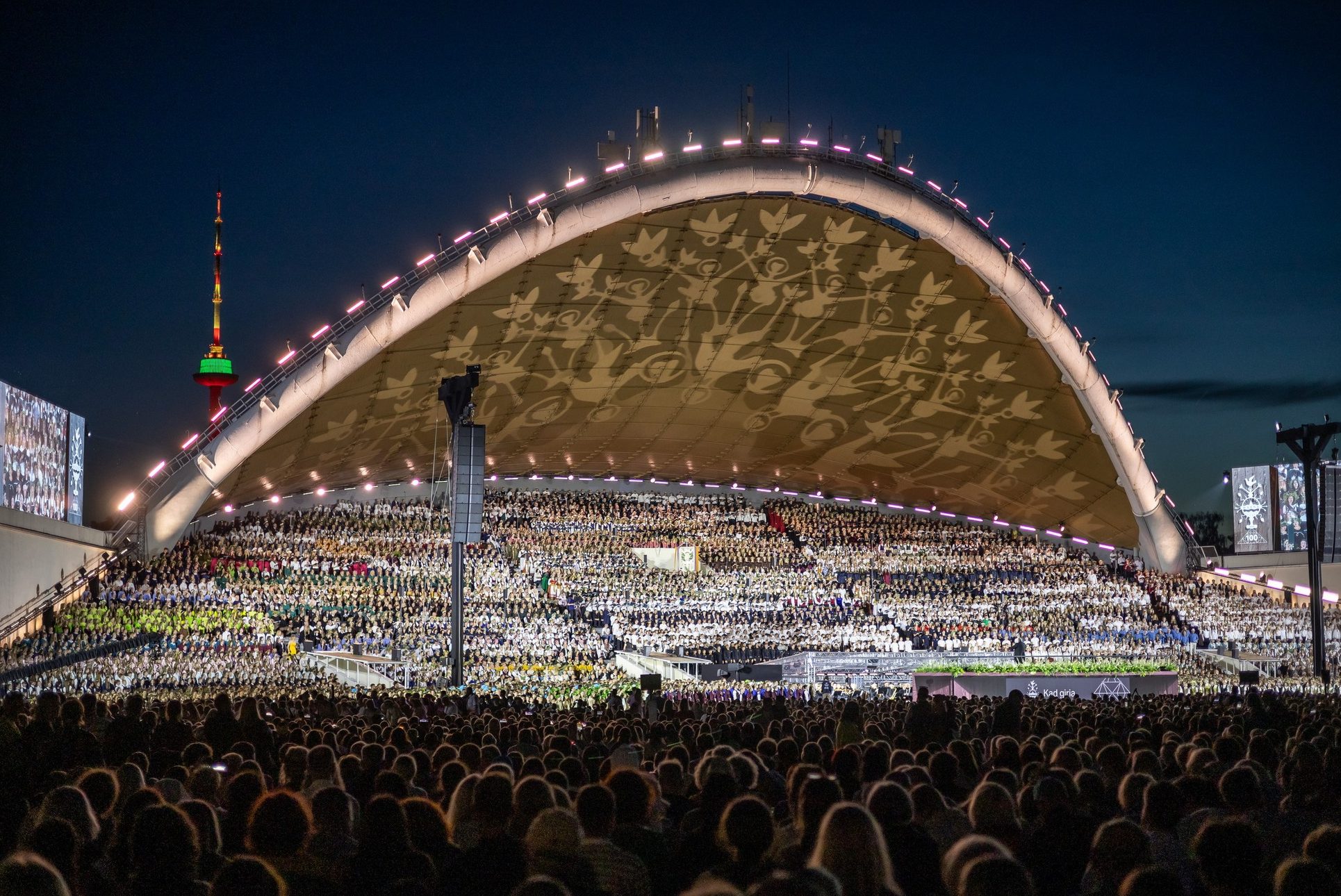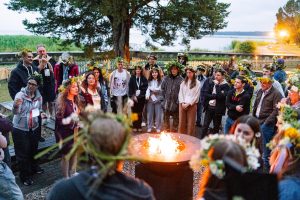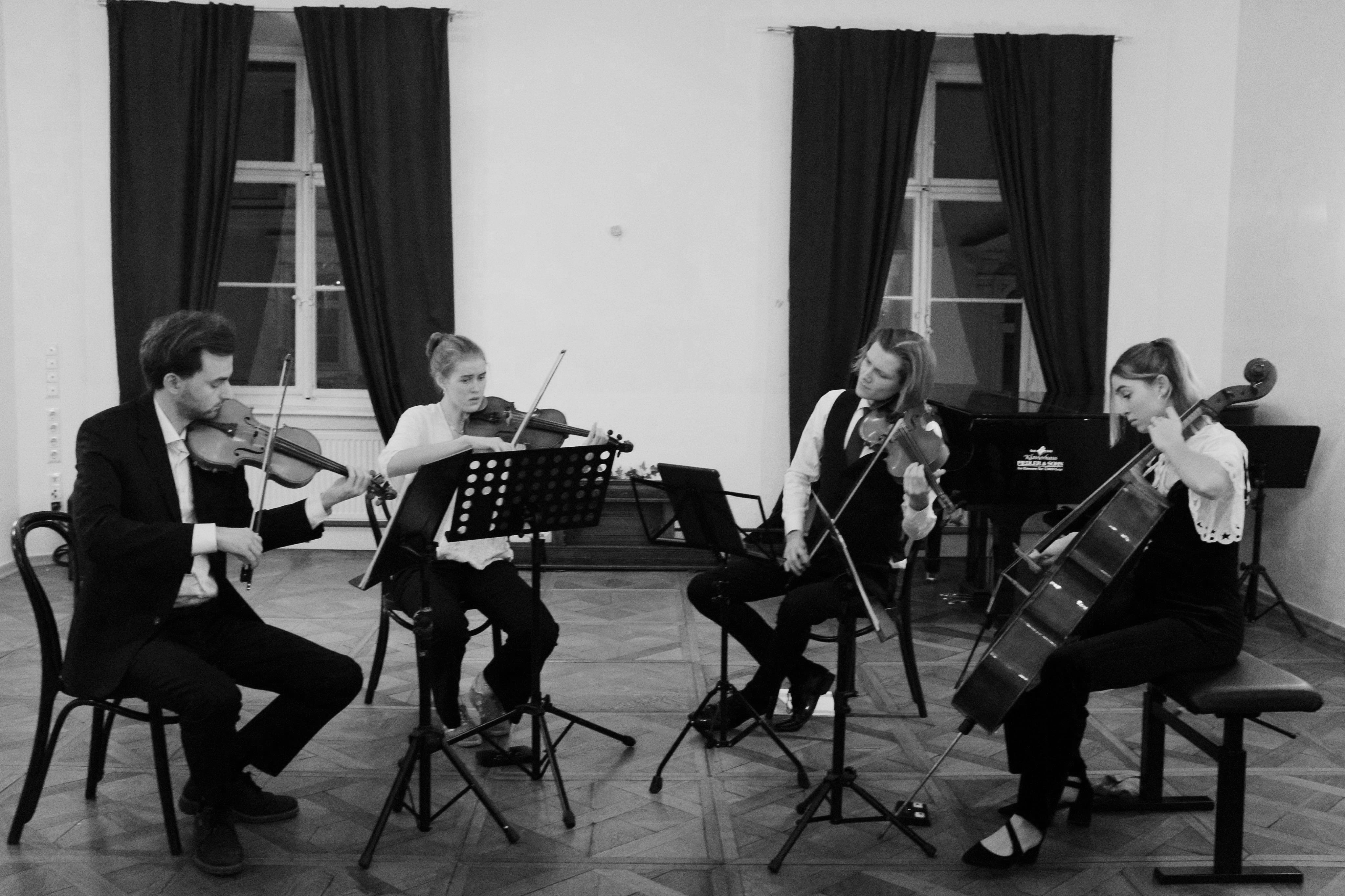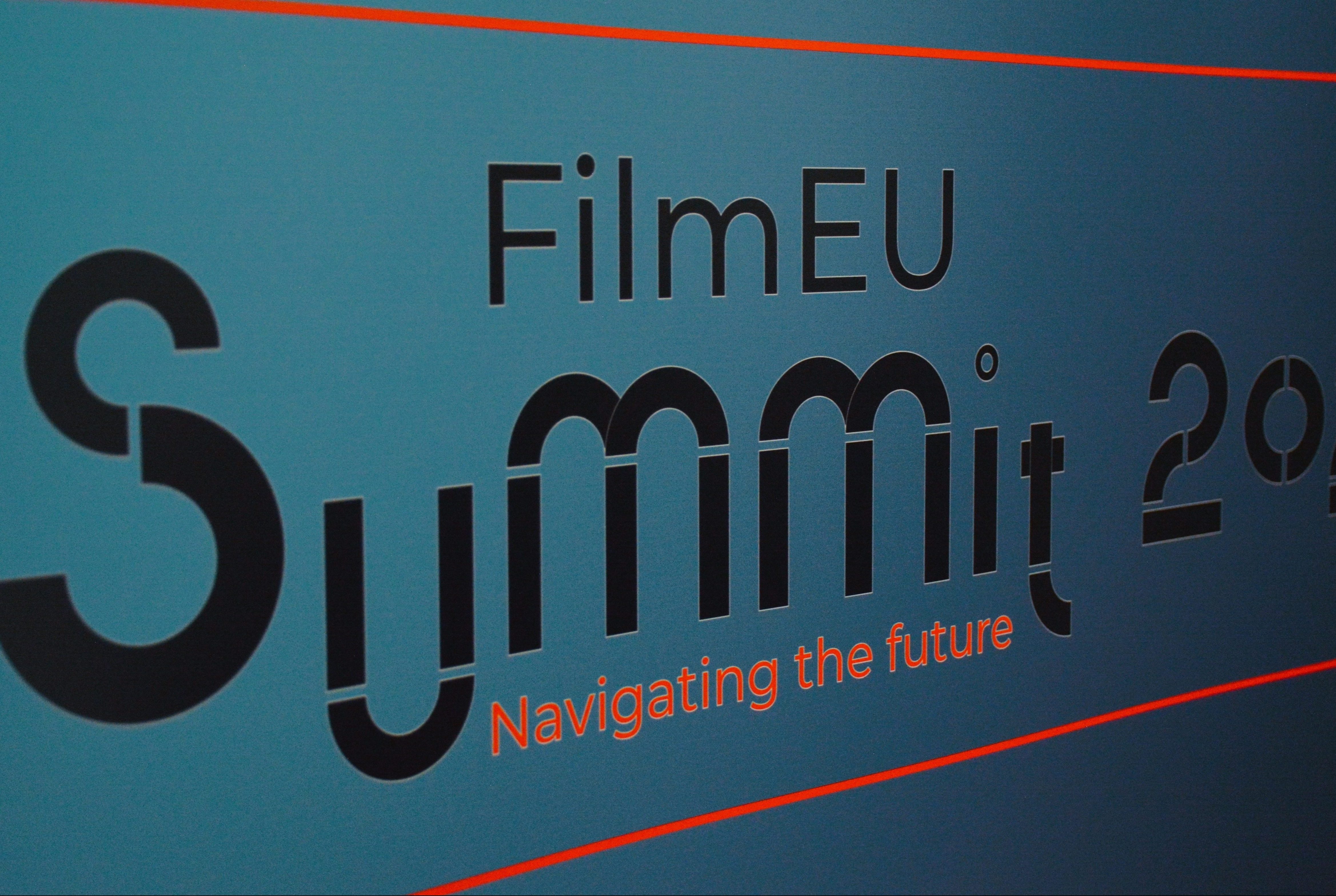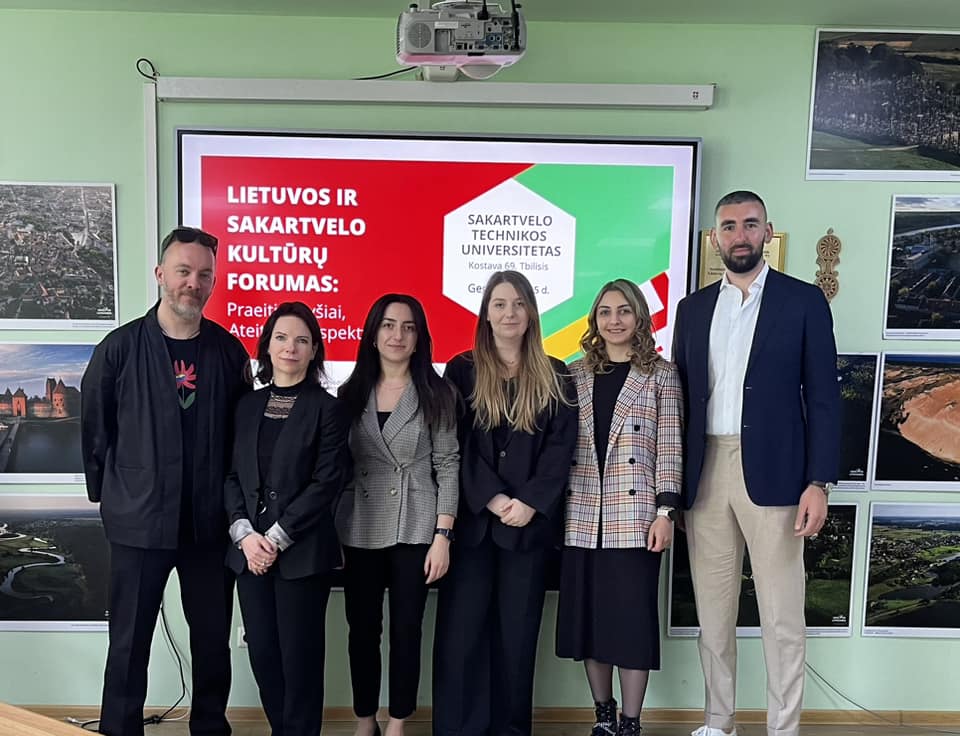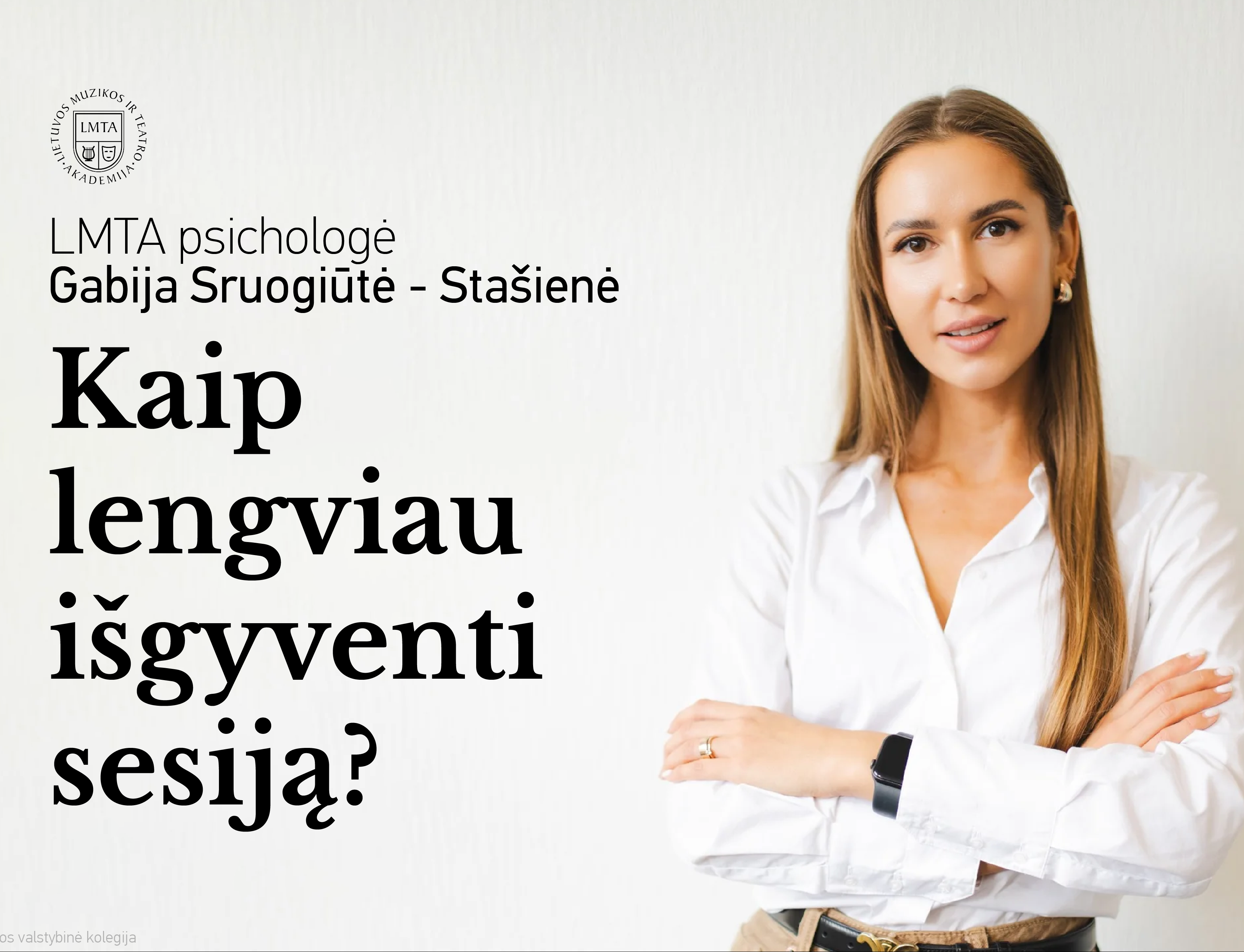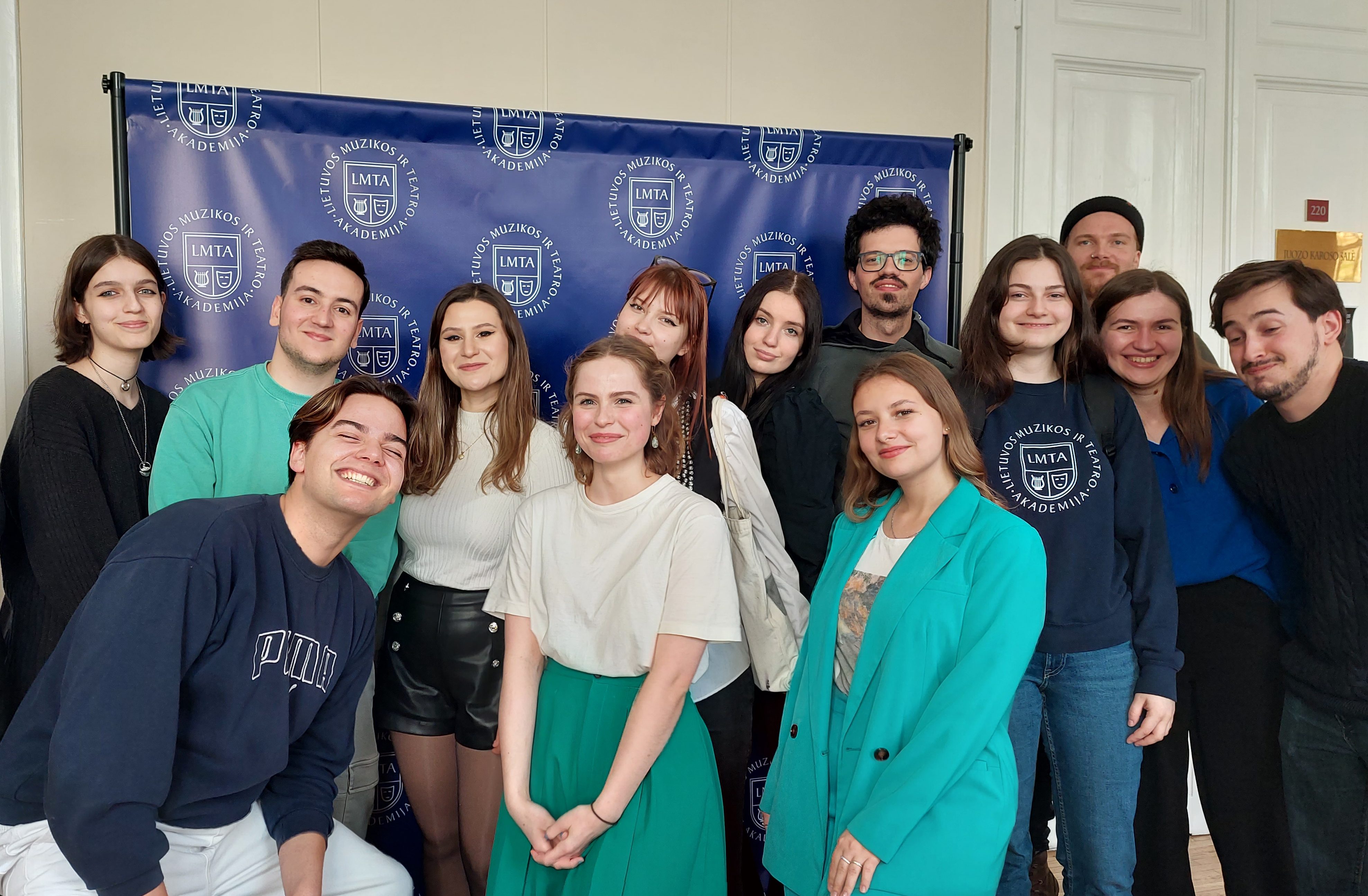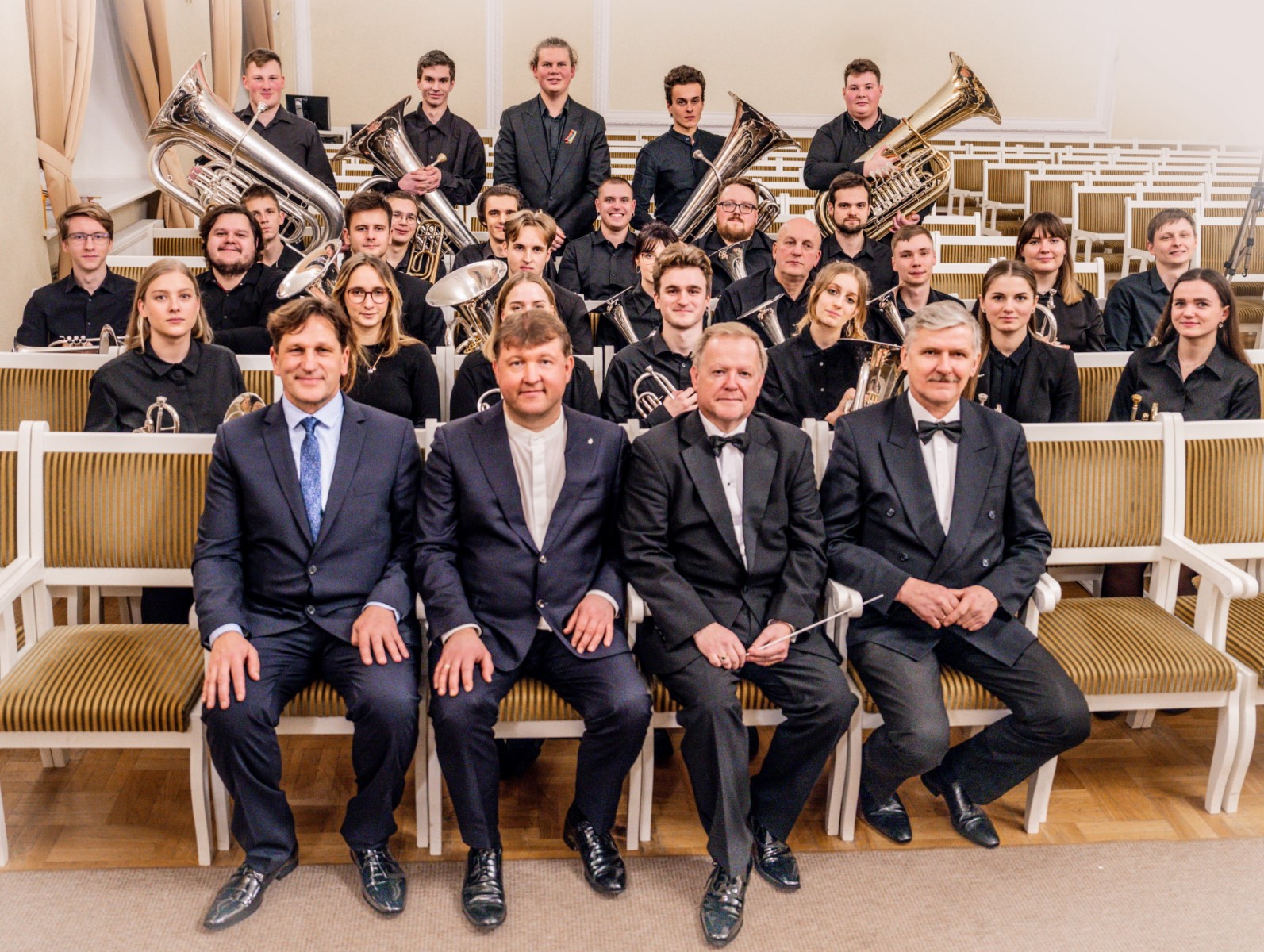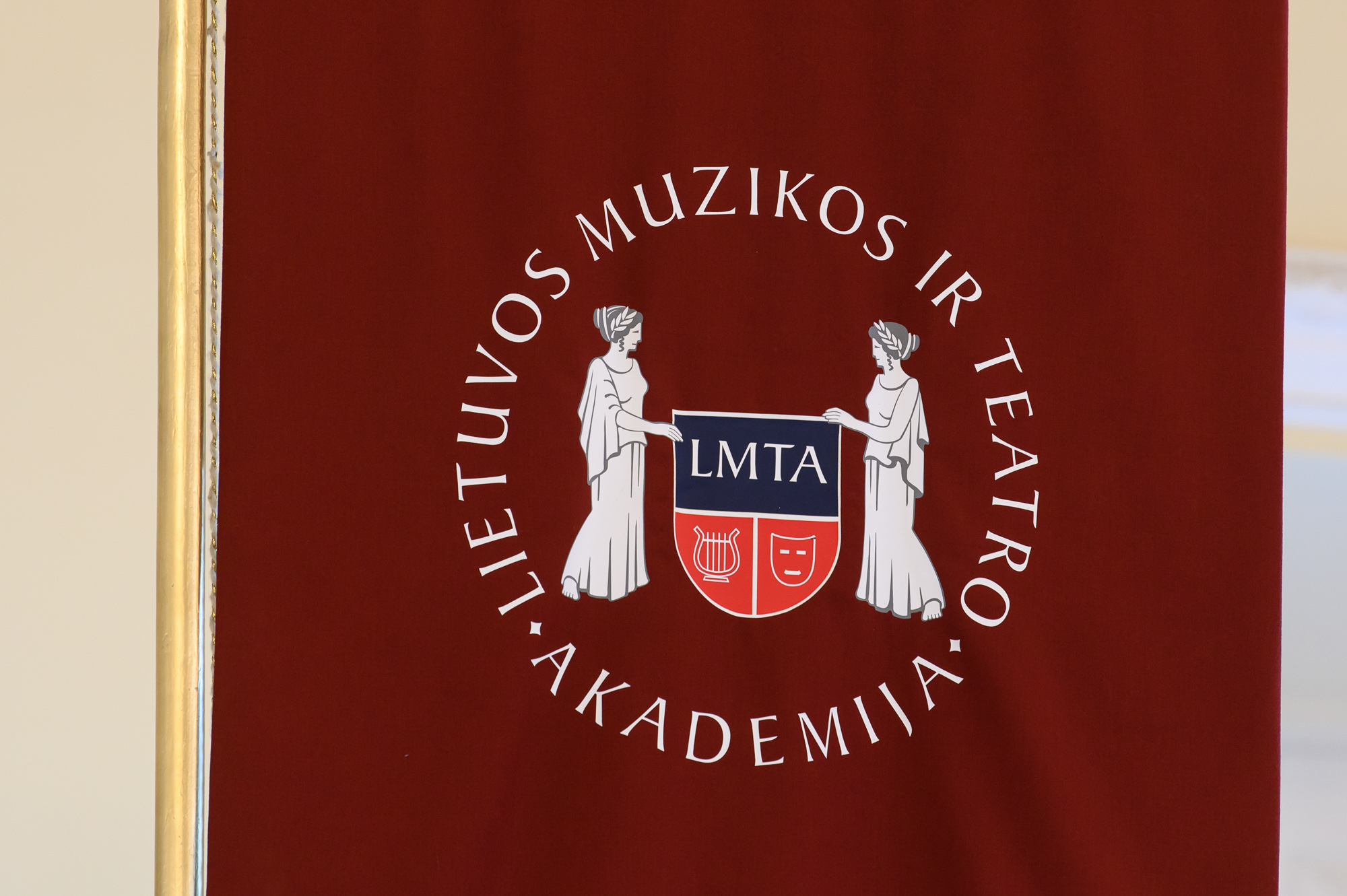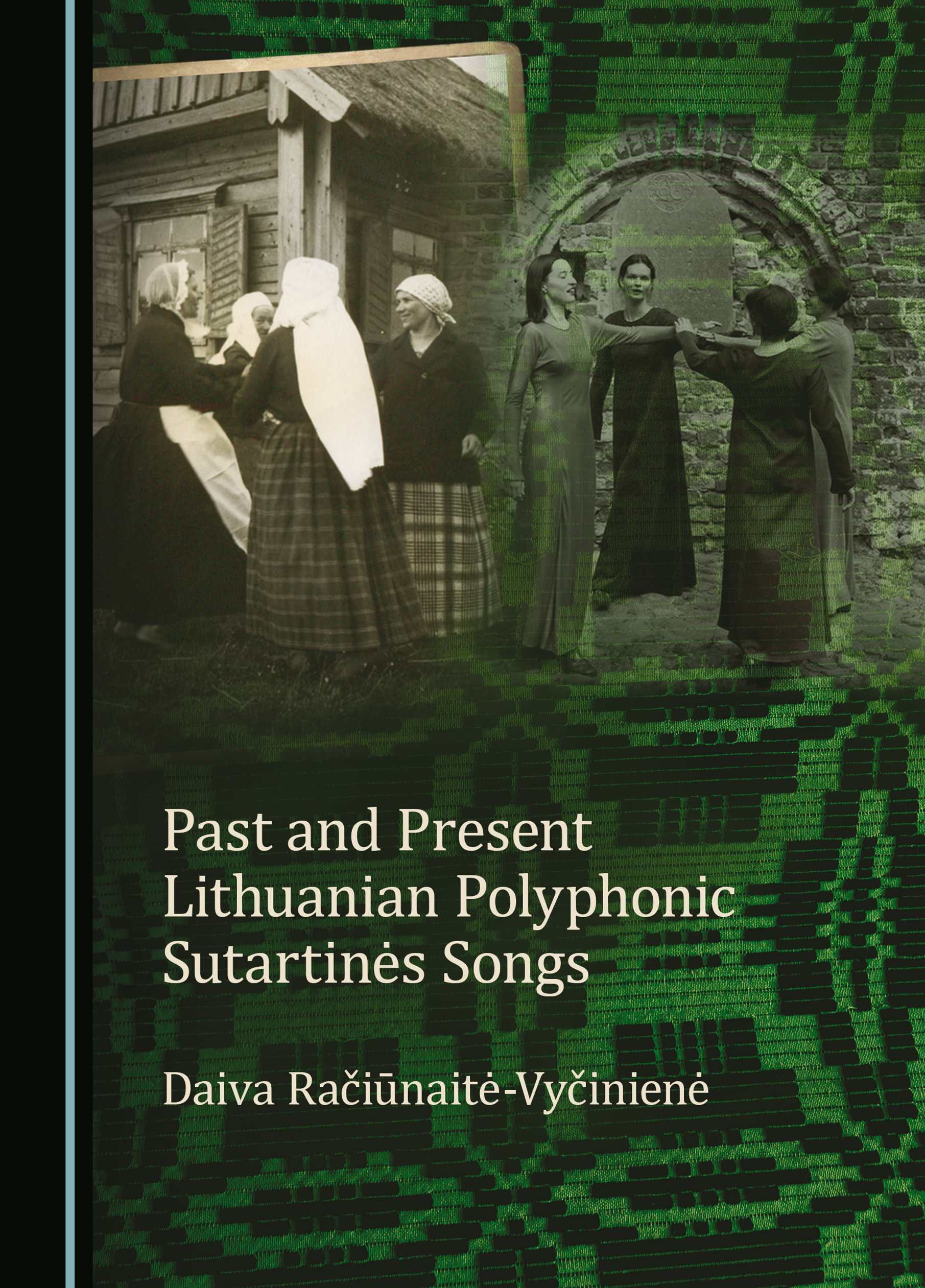Sorry, but this page is only available in Lithuanian. For more information about LMTA events in English, check out the Events section on our front page (below the News section).
Our site uses cookies to ensure you quality of service. By continuing browsing you agree with our Cookie policy , Privacy policy
News
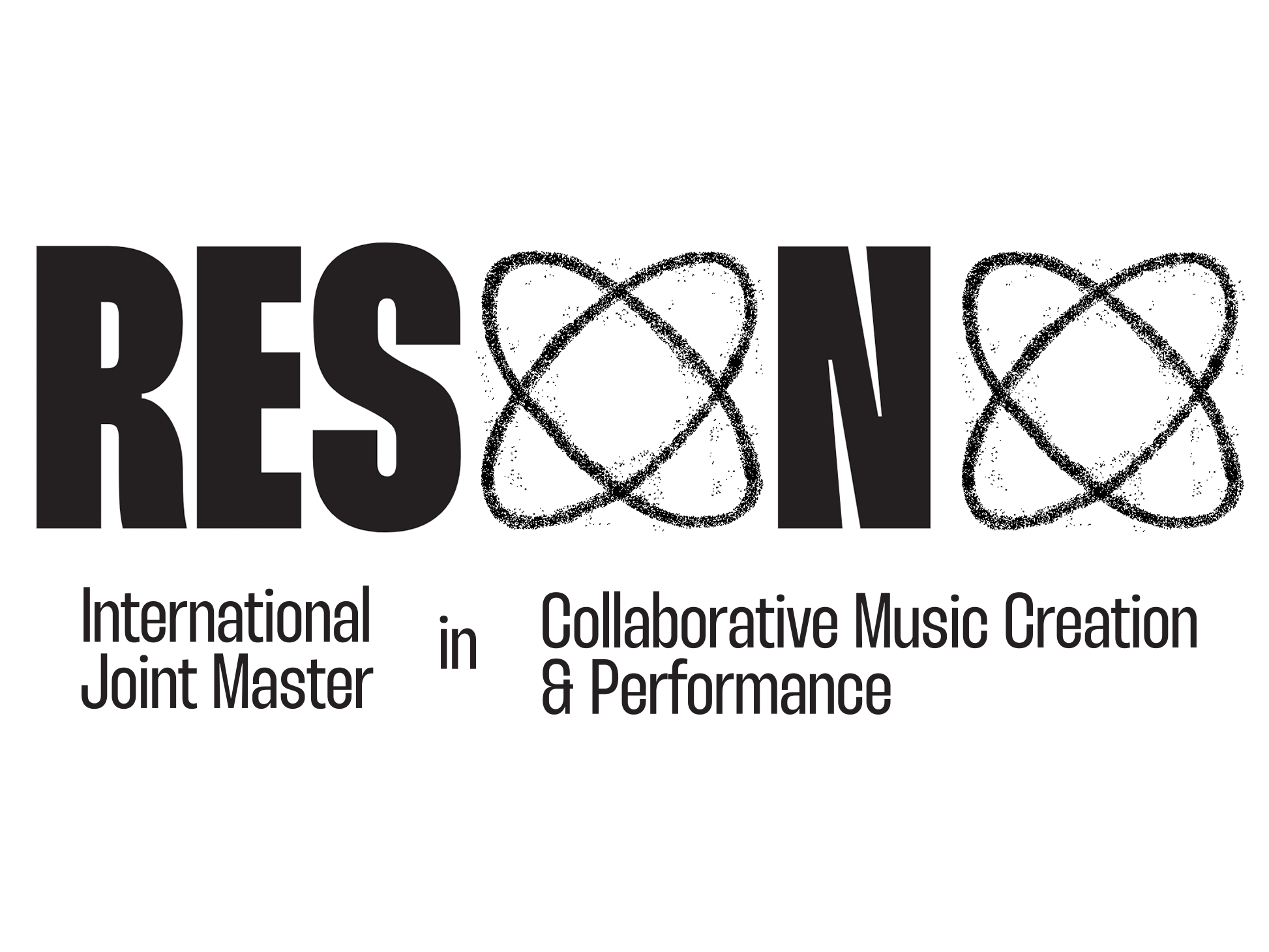
New RESONO Joint Master’s Programme: international music creation and performance studies
The Lithuanian Academy of Music and Theatre (LMTA) together with its partners is launching a new joint Master’s programme in English – RESONO: Collaborative Music Creation and Performance. This programme is unique in its internationality and the opportunities for collaboration between three renowned higher education institutions: Royal Conservatoire Antwerp, Escola Superior de Música e Artes do Espetáculo (ESMAE) and the Lithuanian Academy of Music and Theatre. The aim of the programme is to develop creative music performers and creators who are able to work in an international team and present contemporary musical projects.
RESONO has recently been accredited in Portugal, where it has been granted a maximum accreditation period of six years. This reflects the high quality and international recognition of the programme. Students will have the opportunity to study in different countries and contribute to joint creative projects, thus gaining a unique international experience. The programme places particular emphasis on co-creation in order to create innovative and professional musical solutions.
The new programme is scheduled to start in the academic year 2025-2026. Further details on admission requirements and the study schedule will be announced in the near future. For more information about the RESONO Master’s programme, please visit:
https://resonojointmaster.com
https://lmta.lt/en/english-international-relations/english-projects/resono/
2024 10 21
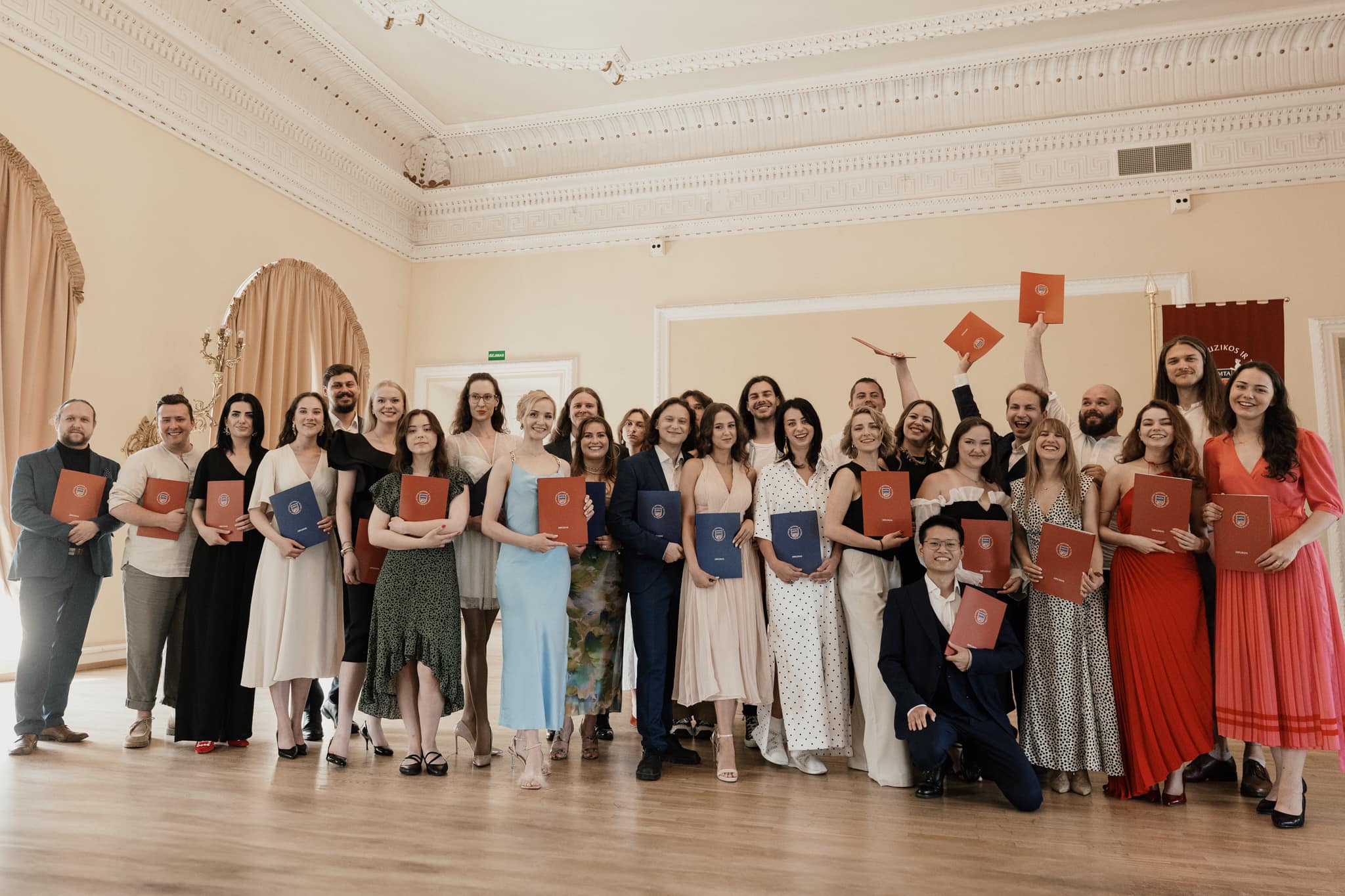
Congratulations to the graduates of the Lithuanian Academy of Music and Theatre!
This year, we saw off half a hundred and fifty bachelors and over a hundred masters from the Lithuanian Academy of Music and Theatre with their diplomas in hand!
The largest number of graduates from the Faculty of Music – 68 bachelors and 73 masters. The Faculty of Theatre and Film has 58 and 30 bachelors and masters respectively, while the Faculty of Klaipėda has 24 undergraduates and 9 postgraduates.
We are happy and proud of all those who have chosen the Lithuanian Academy of Music and Theatre for their higher education and the start of their professional careers. There are many opportunities for graduates now, and continuing their studies at the next level – Master’s or PhD – is one of them.
So we wish to see you again in the classrooms of the Academy as you continue your journey of music, theatre, cinema art and self-discovery!
Please also note that you will find photos of the graduation ceremony in the photo gallery.
2024-07-02
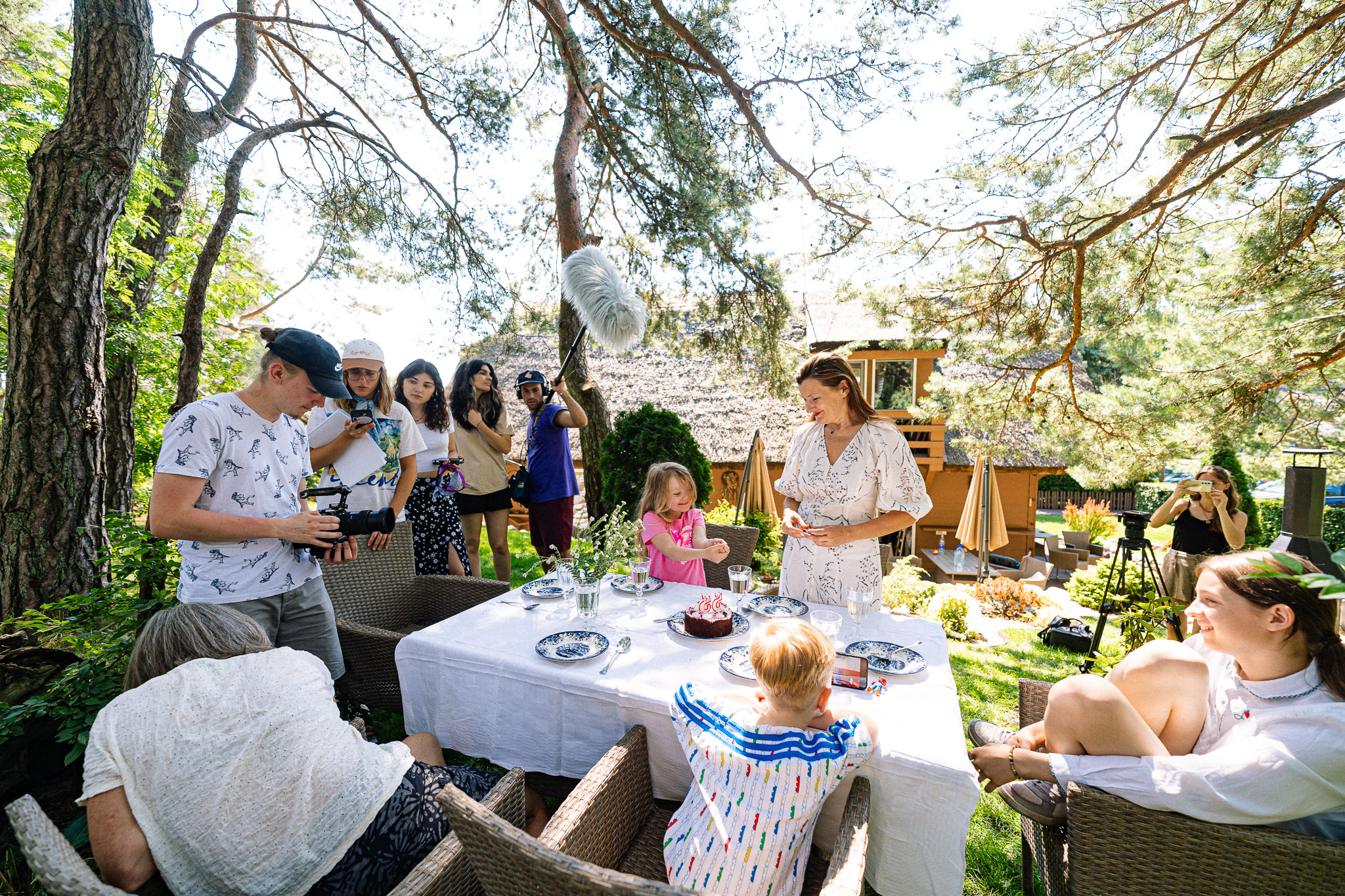
New faces: the 26th Summer Media Studio 2024 brings together creators from Lithuania and around the world
Facing the shortest night of the year, the Lithuanian Academy of Music and Theatre (LAMT) together with the Audiovisual Arts Industry Incubator (AMII) gathered young filmmakers from all over the world to the 26th edition of the International Film Workshop “Summer Media Studio 2024” in Pervalka!
This year, participants from 11 countries. The organisers are very happy to see a real Neringian, cameraman Adomas Barkauskas, among this year’s motley group of participants. The selected filmmakers will participate in the project for two weeks, from 23 June to 6 July. Throughout the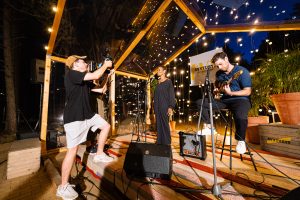 project, the participants will deepen their theoretical and practical knowledge, and will work closely with each other and with experienced teachers, who are always ready to share the subtleties of the art of filmmaking and are ready to help. In order to cover each area of film production more and more, each year the Summer Media Studio delves deeper into a different area of the industry, and this year’s theme, “Script Mastery”, gives participants the opportunity to gain a deeper understanding of the cinematic story and its fulfilment by turning the urban and natural areas of Neringa into film sets.
project, the participants will deepen their theoretical and practical knowledge, and will work closely with each other and with experienced teachers, who are always ready to share the subtleties of the art of filmmaking and are ready to help. In order to cover each area of film production more and more, each year the Summer Media Studio delves deeper into a different area of the industry, and this year’s theme, “Script Mastery”, gives participants the opportunity to gain a deeper understanding of the cinematic story and its fulfilment by turning the urban and natural areas of Neringa into film sets.
The participants have already received lectures and shared their knowledge and experience from unique filmmakers, who have also come from all over the world: Oscar-nominated filmmaker Jonathan Tammuz (Canada/UK), screenwriter and director Damià Serra Cauchetiez (Spain, Catalonia), Indiana University screenwriting professor Susan Kelly (USA), producer and professor Anna Huth (Poland), producer Paul Nethercott (USA).
This year the participants have been divided into 8 film production teams and are already in the process of filming for the shooting days. The participants are making great use of the existing opportunities in the area, interacting and collaborating with local residents, entrepreneurs and cultural representatives, as well as diving in the places that have become symbols of Neringa. So if you see groups making films on the island of Neringa with laughter and great ideas, don’t be scared, they are the Summer Media Studio participants. And already on 5 July at 6 pm. On 5 and 5 pm, at the Liudvikas Reza Cultural Centre in Juokrante, you will have the opportunity to see films made by young artists. More information: www.summermediastudio.lt.
The organisers of the project are the Lithuanian Academy of Music and Theatre and the Audiovisual Arts Industry Incubator.
Project sponsors and partners: Neringa City Municipality, Creative Europe MEDIA Bureau, Erasmus+, Klaipėda City Municipality, State Fund for Studies, Lithuanian Film Centre, AVAKA, LAMT Student Representation, VilniusTECH, Vilnius Gediminas Technical University Student Representation, Latvian Academy of Culture, Tallinn University, Beira Interior University, Neringa – Culture Island, Karaliaus Mindaugas Vocational Training Centre, Studio Nethercott, Cine Wave, Klaipėda Film Office, Liudvikas Reza Culture Centre, Klaipėda Youth Theatre, Taško Theatre.
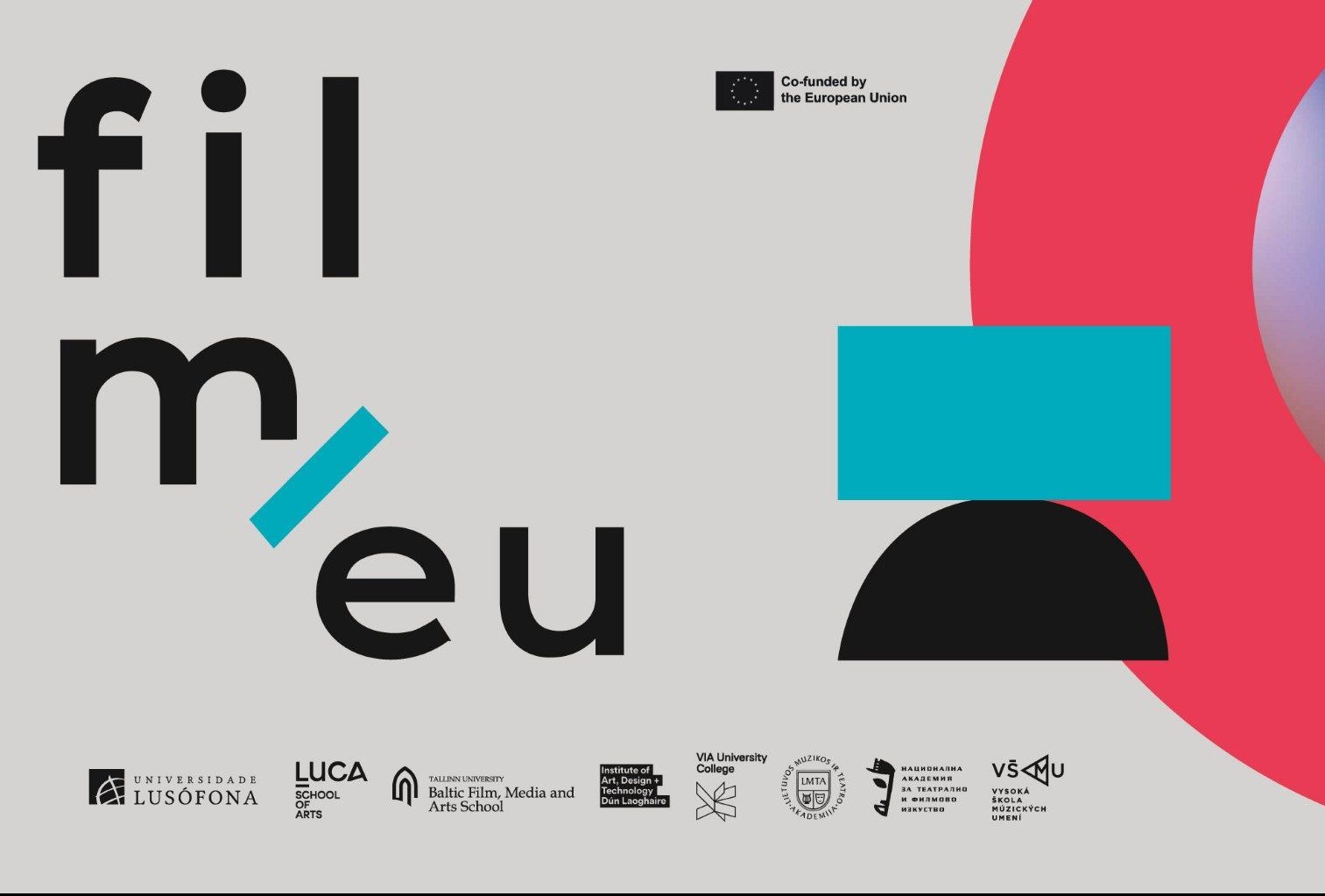
Unconscious Bias Training for the Creative and Cultural Industries
FilmEU, an alliance of European Creative Industries Schools, of which the Lithuanian Academy of Music and Theatre is a member, invites the academy’s lecturers and students to a seminar on unconscionable bias.
Have you heard of unconscious bias, but are unsure what it really means? Would you like to examine the impact unconscious bias has within the creative and cultural industries? Join us for this session to help you develop an understanding and awareness of how unconscious bias works, and learn strategies to help reduce its negative impact.
In the creative and cultural industries, we often work in roles where we create media, or support the creation of media, that is consumed by the masses. With this role comes the responsibility of telling stories that fairly and accurately reflect the diversity of our world. If we do not understand the concept of unconscious bias, then we cannot ensure that the media that we create does not endorse negative stereotypes. These stereotypes and unconscious biases can also affect the way we work in diverse, multi-national teams.
In this online workshop, IADT’s Equality, Diversity and Inclusion team will explore what unconscious bias is and how it can manifest in our creative and professional work. We will provide strategies for helping to check our biases, and steps to introduce into your work to ensure we are staying alert to these biases.
Session outline:
• Statistics from creative and cultural industries across Europe
• What unconscious bias is and how it impacts our judgement
• Different types of bias
· How unconscious bias can play out in the creative and cultural industries and the negative impact it can have
• How unconscious bias can play out within work relationships within diverse, multi-national teams
• Practical tools and techniques to help address and mitigate unconscious bias in your working lives
Date: 2024 m. June 11th
TIme: 1300 (EEST)
Registration: https://videoconf-colibri.zoom.us/meeting/register/tJcsce2vqzIqH9MH3F_ijVzSyj6T0eUSM-zt#/registration
More info: https://www.filmeu.eu/news/filmeu-unconscious-bias-training-for-the-creative-and-cultural-industries
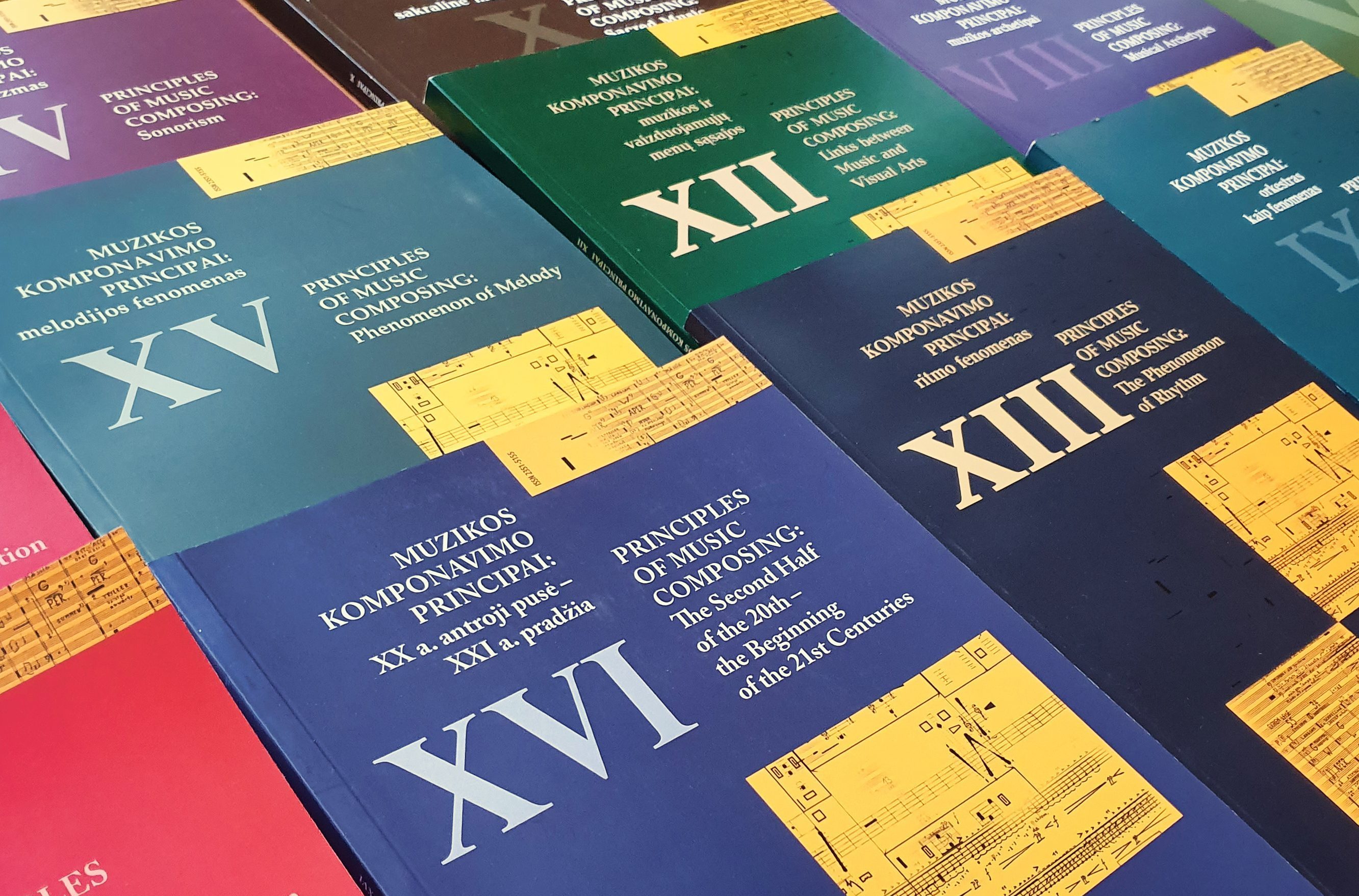
Call for proposals for the conference “Principles of Music Composition”
24th International conference of music theory “Principles of Music Composing: Ethno- in Contempo” will take place in November 13–15, 2024, Vilnius, Lithuania.
 24th International Conference Principles of Music Composing invites scholars to explore the role of ethnicity in the modern world. The aim of the conference is to reassess the significance of ethnicity in the music of the 20th and the 21st century with a focus on highlighting the aesthetic and technical possibilities of its expression. It is easy to observe, that throughout the history of Western professional music, the function of ethnic aspects has often been reduced to mere recognition, while their development mostly relies on co-cultural structural principles. However, contemporary philosophic paradigms encourage us to reevaluate the relationship between the ethnos and a modern creative individual, which leads us into the search for more appropriate functional and structural approaches. In contemporary contexts, ethnicity can spread in the most unexpected assemblages: from a unifying or segregating factor of identity to commercial appropriations aimed at mass consumption.
24th International Conference Principles of Music Composing invites scholars to explore the role of ethnicity in the modern world. The aim of the conference is to reassess the significance of ethnicity in the music of the 20th and the 21st century with a focus on highlighting the aesthetic and technical possibilities of its expression. It is easy to observe, that throughout the history of Western professional music, the function of ethnic aspects has often been reduced to mere recognition, while their development mostly relies on co-cultural structural principles. However, contemporary philosophic paradigms encourage us to reevaluate the relationship between the ethnos and a modern creative individual, which leads us into the search for more appropriate functional and structural approaches. In contemporary contexts, ethnicity can spread in the most unexpected assemblages: from a unifying or segregating factor of identity to commercial appropriations aimed at mass consumption.
The conference is woven into a triptych of events dedicated to the issue of interaction between globality and locality (nationality, nationality, ethnicity, minority, cultural boundaries). This year’s event seems to build a bridge between the interaction of globality and nationality, which was examined last year, and next year’s 150th anniversary of the Lithuanian creative genius M.K. Čiurlionis.
Topicalities of the conference are reflected in the suggested sub-topics:
- Interactions and intersections between ethno- and contempo: theoretical, historical, philosophical discourses regarding the expression of ethnicity in contemporary contexts.
- Ethno- in sociopolitical and sociocultural contexts: discourses concerning cultural politics, identity, protest, minorities;
- Functions of ethno- in contemporary practice of music composition: recognizability, exoticism, conformism, protest, etc.;
- Technical solutions for the expression of ethno- in modern practice of music composition (aspects of timbre, rhythm, melody, modes, formal structures, aesthetics, communication, etc.);
- Traditional means of ethnical expression (heterophony, monody, etc.) in modern practice of music composition;
- Multidimensionality of ethno- in contemporary practice of music composition (aspects of audiation, notation, performance, communication);
- Interdisciplinary nature of Ethno- in Contempo (syncretism, synthesis, multimedia, etc.)
Paper proposals (abstract of the presentation and a short biography) must be sent to the email: pmc.lmta@gmail.com. Annotation must not exceed 500 words. The approximate duration of the presentation is 20–25 min.
The deadline for submitting the proposal is September 8, 2024. All proposals will be evaluated by the scientific committee. All applicants will be informed about the committee’s decision by September 20.
The conference will be in English. The participants will be given an option to present online.
Participation fee* (only once selected by the scholarly committee):
in person – 30 €;
online – 50 €.
- If you are not able to pay the participation fee, please contact us for the waiver.
Selected papers of the conference will be published in the annual peer journal ‘Principles of Music Composing.’
Organizers: Lithuanian Composers’ Union / Lithuanian Academy of Music and Theatre
Scholarly committee of the conference:
Prof. Dr. Rimantas Janeliauskas (Lithuanian Academy of Music and Theatre)
Prof. Dr. Antanas Kučinskas (Lithuanian Academy of Music and Theatre)
Prof. Dr. Mārtiņš Viļums (Lithuanian Academy of Music and Theatre)
Assoc. prof. Dr. Marius Baranauskas (Lithuanian Academy of Music and Theatre)
Prof. Dr. Pavel Puşcaş (Music Academy Cluj-Napoca, Romania)
Prof. Miloš Zatkalik (University of Arts in Belgrade, Serbia)
Prof. Roger Redgate (Goldsmiths, University of London, England)
Dr. Bert Van Herck (New England Conservatory of Music, USA)
Dr. Jānis Petraškevičs (Jāzeps Vītols Latvian Academy of Music, Latvia)
Dr. Martin Vishnick (United Kingdom)
Coordinators of the conference:
Assoc. prof. Dr. Marius Baranauskas,
Dr. Andrius Maslekovas.
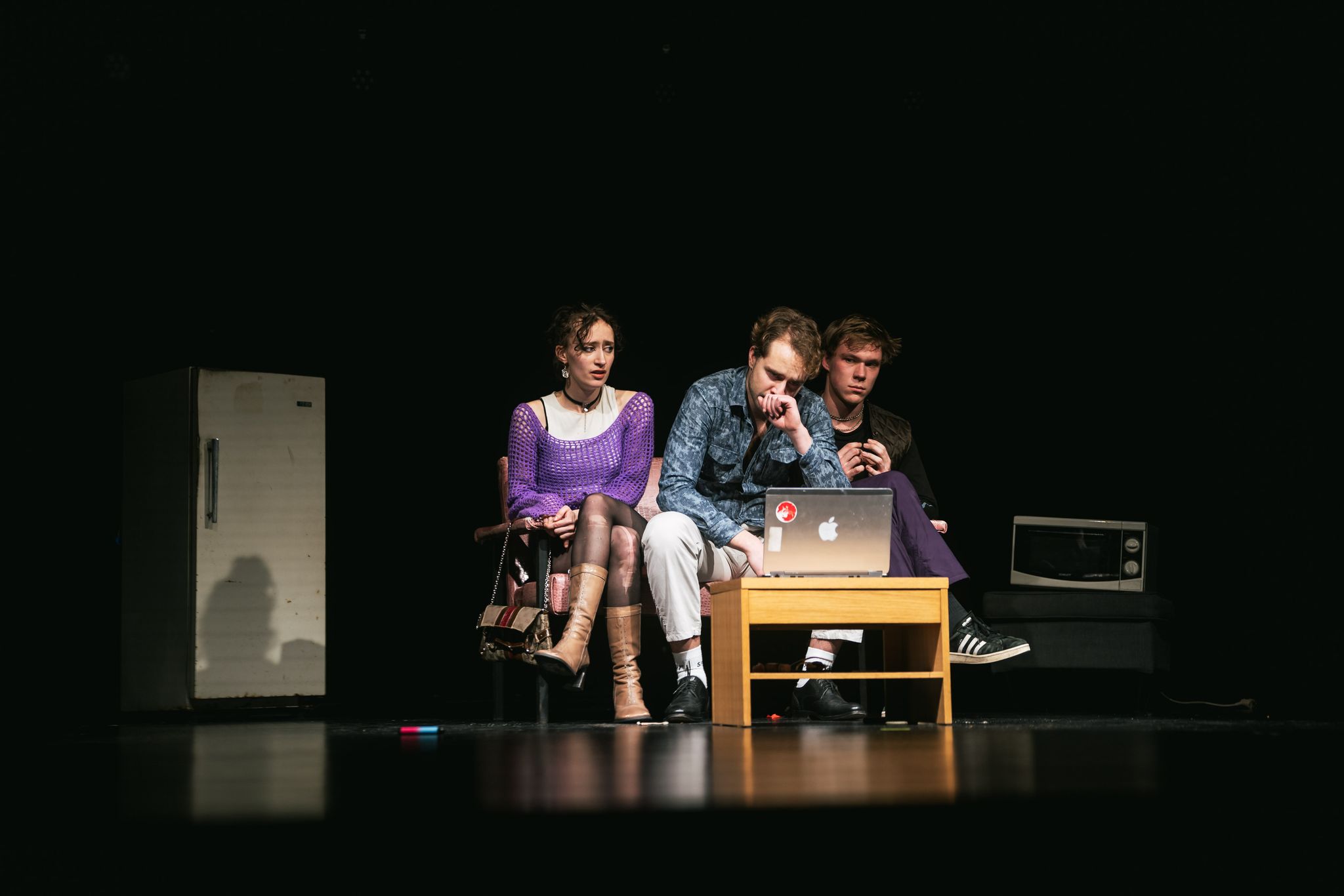
New Lithuanian actors’ final works on the theatre stages
New theatre actors will perform on Lithuanian theatre stages: the Lithuanian Academy of Music and Theatre invites you to visit the Theatre Art Acting Final Works until the end of May. Theatre Works will be presented at the Lithuanian Academy of Music and Theatre, the Lithuanian National Drama Theatre, Vilnius Theatre “Lėlė” and the Oskaras Koršunovas Theatre.
“Graduation performances always arouse curiosity in the theatre audience, because you can see what new actors are coming to the stage,” says Gintaras Varnas, a professor at the LMTA and a theatre director.
This year, a small course of 9 students will graduate from the G. Varnas course, whose actors will play roles in 8 final performances. Interestingly, most of this year’s Acting graduation works are directed by last year’s graduates – Justinas Vinciūnas, Karolis Zajauskas, Jonas Kuprevičius, Povilas Barzdžius.
“It will be interesting to see plays that have already been staged, but in a different time period, such as “Shopping and f*cking”, based on a play by Mark Ravenhill, or Psychosis, based on Sarah Kane,” says G. Varnas. Professor Varnas adds that the final repertoire will also include the previously popular and now reinterpreted by young people performance of Roland Schimmelpfnnig’s play “Arabian Night”. The audience can also look forward to an interesting work about girls’ personality searches and the theme of love, “Close”, based on the works of two authors – Falk Richter and William Shakespeare.
You can find more final works here.
Most of the events are free of charge, the rest are ticketed by www.bilietai.lt.
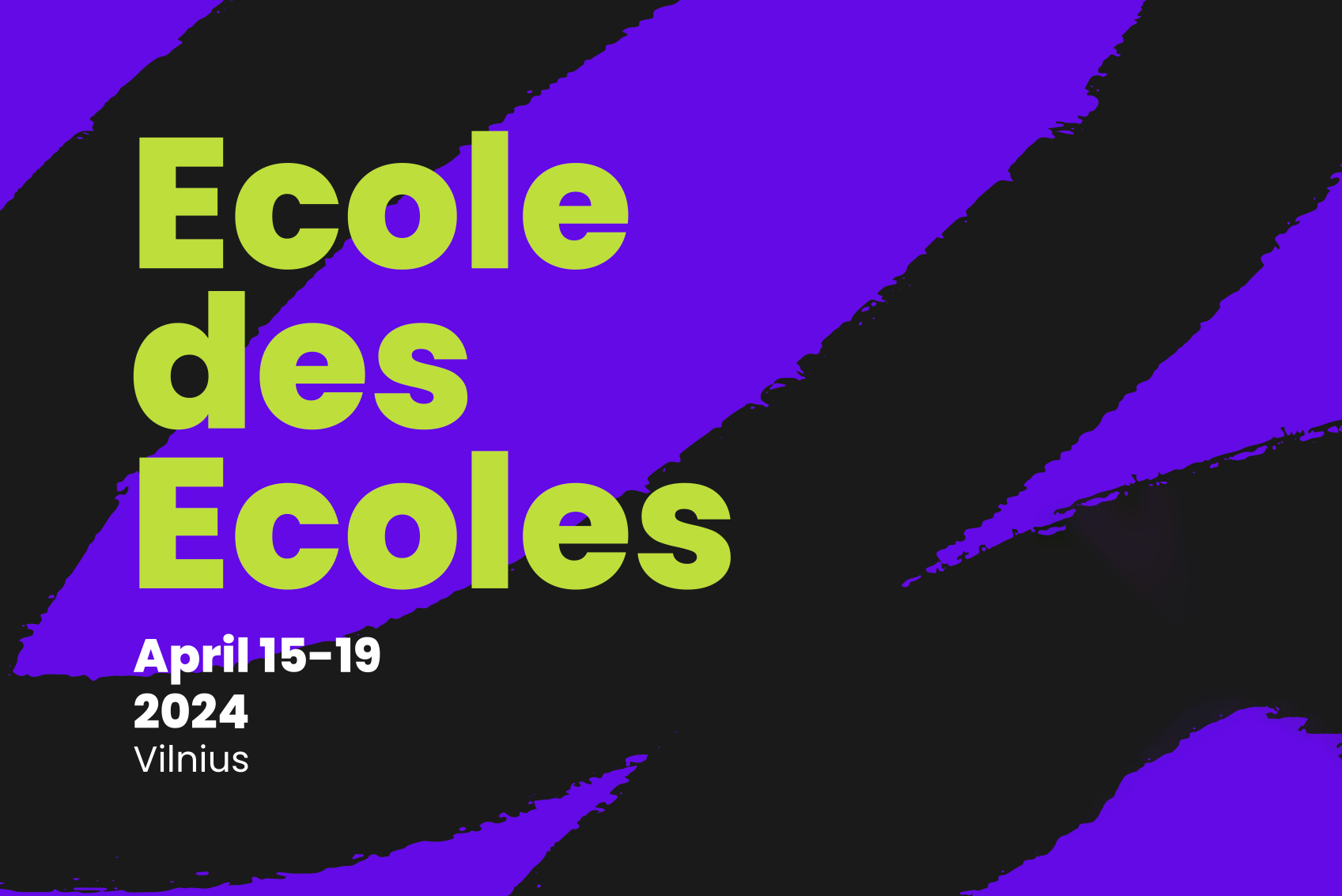
ÉCOLE DES ÉCOLES EVENTS AT THE ACADEMY
Next week, the international organisation “École des Écoles” (EdE) is organising a series of two events in Vilnius. The first event will take place on 15-17 April at the Lithuanian Academy of Music and Theatre and will be a session of seminars, discussions and workshops on the peculiarities of authorship in the field of theatre, hosted by LMTA lecturers, renowned Lithuanian theatre and dance representatives, creators and critics. The second part of the series will include an extraordinary meeting of EdE members on 17-19 April.
“École des Écoles” (EdE) is a European network focusing on teachers and students in performing arts. The network was established in 2006 based on the network “Primo del Teatro” in Italy, which is partly a Summer school for acting and directing students across Europe located in the small village of San Miniato, partly a network of European teachers, who are associated with the Summer school.
EdE consists of partner schools from Spain, Catalonia, Germany, Denmark, UK, France, Italy, Portugal, Lithuania, Belgium, Switzerland, the Netherlands and Norway.
In recent years, the network has sought to strengthen the possibilities of exchange between teachers at European theatre schools. EdE works on developing cooperation between the partner schools through seminars, workshops and meetings.
Read more about École des Écoles (EdE)
European theatre is changing: themes, production processes, the understanding of authorship, collective creativity and emotional well-being are of great interest. The questioning of vertical hierarchies leads to fundamental changes in creative processes and directing.
How to ensure democratic creation and co-authorship in traditional theatre environments? How to adapt to new pedagogical requirements and train theatre makers? These are just some of the key questions that will be discussed in the seminar-discussion “Authorship in Theatre: from the Director and the Text to the Diversity of Voices”, which will take place at the Central Palace of the Lithuanian Academy of Music and Theatre (42 Gedimino Ave., Vilnius) on 15-17 April.
This seminar invites theatre and performing arts educators and practitioners, as well as representatives of other disciplines, to explore different approaches to the question of authorship in theatre production. The aim of the workshop is to exchange different approaches, practices and experiences on different ways of collaboration.
The seminar will consist of three different workshops:
- “Reimagining directing”.
- “Stories told by bodies. The stories bodies tell. Exploring Dance Dramaturgy
- “Clowning and playfulness: in search of a different approach to theatre authorship”
The workshop will be led by LAMT lecturers, renowned Lithuanian theatre and dance representatives, creators and critics – Yana Ross, Augustas Gornatkevičius, Naubertas Jasinskas, Agnija Šeiko, Goda Dapšytė, Žilvinas Beniušis.
On 17-19 April, the Lithuanian Academy of Music and Theatre will host an extraordinary meeting of the members of the École des Écoles network. The meeting will discuss the organisation’s past and future activities, and elect new members to the institution’s board.
Representatives of the performing arts from Lithuania, Ukraine, Denmark, Belgium, Switzerland, Romania, Portugal, France, Norway, the United Kingdom and Belgium will participate in École des Écoles events in Vilnius.
2024 04 12
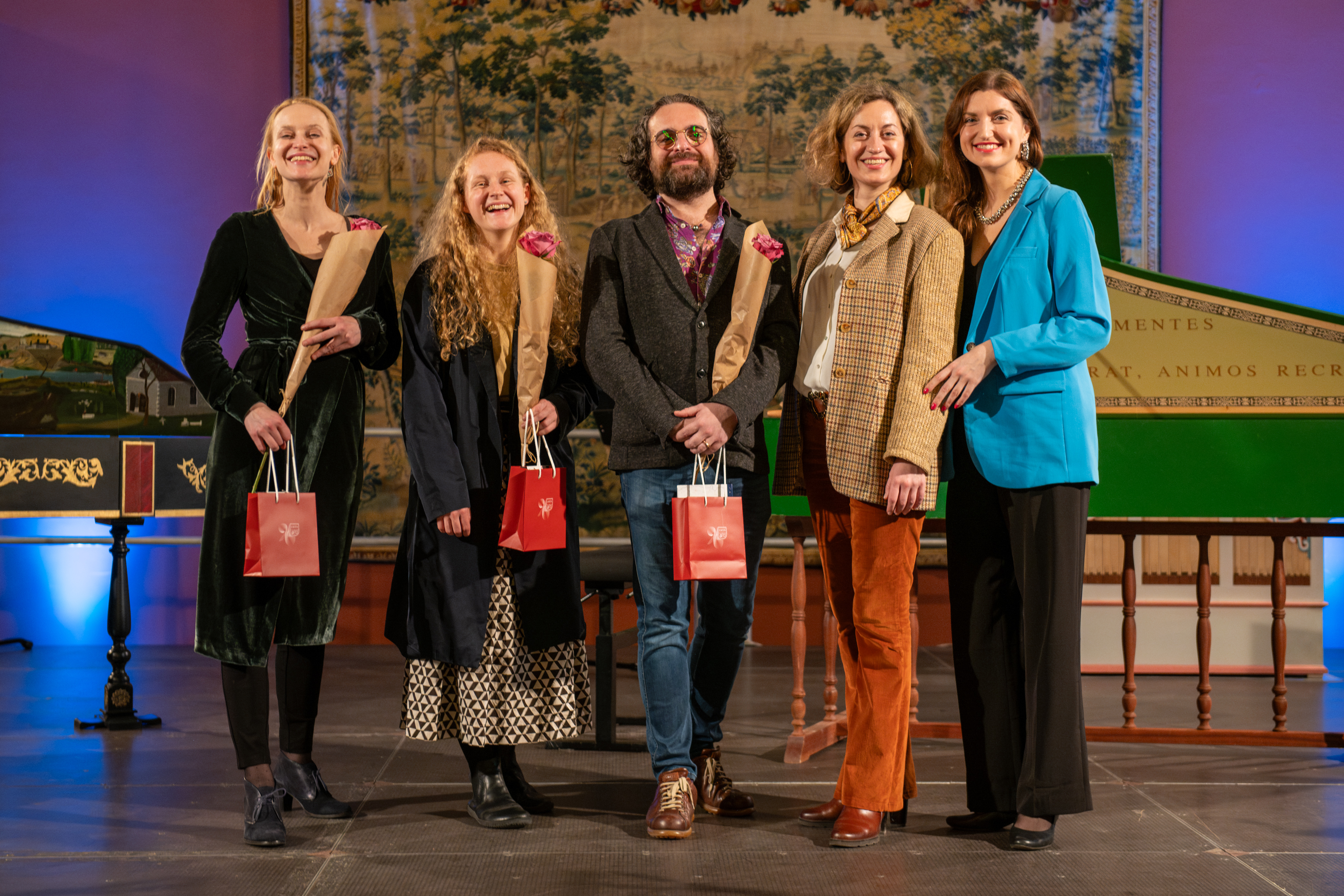
A Few Glimpses of Early Music Week, LMTA Erasmus+ BIP course, 19-23 March 2024
On 19-23 March 2024, the Lithuanian Academy of Music and Theatre (LMTA) together with partner institutions – The University of Music and Performing Arts Graz (Austria), the Krzysztof Penderecki Academy of Music in Kraków (Poland), the Jāzeps Vītols Latvian Academy of Music (Latvia), and the National Museum of the Palace of the Grand Dukes of Lithuania – ran Early Music Week, Erasmus+ Blended Intensive Programme (BIP) courses.
During the courses, LMTA students and their peers from abroad, all specialising in the Baroque vocal performance and Early Music instruments (the Baroque flute (the flute traversière), plucked string instruments), gathered in the masterclasses by acclaimed Early Music performers and teachers Dr. Flavio Ferri-Benedetti (Schola Cantorum Basiliensis, Switzerland), Lea Sobbe (Kunstuniversität Graz, Austria), and Ieva Baltmiškyte (Muziekacademie Schaarbeek J. H. Fiocco, Belgium) to advanced their knowledge of the Renaissance and Baroque repertoire, and Early Music performance and technique.
Early Music Week also hosted lectures by musicologist Dr. Aleksandra Pister and musician Ieva Baltmiškytė, as well as a series of concerts and educational events. On 23 March 2024, the project culminated in the final concert on the stage of the National Museum of the Palace of the Grand Dukes of Lithuania featuring the participants of the Erasmus+ BIP master classes.
The Early Music Week under Erasmus+ BIP saw cooperation of 12 students and 5 teachers from foreign music universities with their peers from the LMTA.
The project was organised by the Lithuanian Academy of Music and Theatre.
Project partners: The University of Music and Performing Arts Graz (Austria), the Krzysztof Penderecki Academy of Music in Kraków (Poland), the Jāzeps Vītols Latvian Academy of Music (Latvia), and the National Museum of the Palace of the Grand Dukes of Lithuania.
Partner of the concert “Music in the Underground Gallery” – Vilnius TV Tower.
The final concert of the Early Music Week Erasmus+ BIP and the “Music in the Underground Gallery” concert are part of the 10th International Marco Scacchi Early Music Festival.
LMTA Students’ Union, LMTA Art Centre, LMTA Music Innovation Studies Centre have helped us to implement the project.
Photos by Marija Frolova.
Photos of the final concert of the Early Music Week Erasmus+ BIP at the Palace of the Grand Dukes of Lithuania and the concert “Music in the Underground Gallery” at the Vilnius TV Tower by Vytautas Abramauskas.
More photos: https://lmta.lt/lt/fotografiju-galerija/
Events
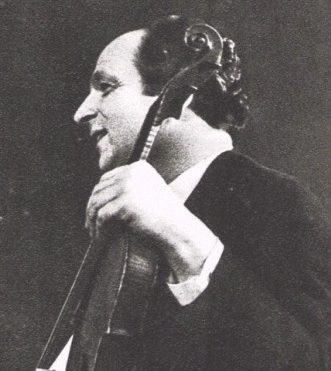
STRING COMPETITION DEDICATED TO THE 100TH ANNIVERSARY OF THE VIOLA PROFESSOR JURGIS FLEDŽINSKAS
14-15 December 2024
LMTA II (Congress) Building Chamber Hall (Tilto st. 16/Vilniaus st. 6-2, Vilnius)
STRING COMPETITION DEDICATED TO THE 100TH ANNIVERSARY OF THE VIOLA PROFESSOR JURGIS FLEDŽINSKAS

Students of Lithuanian higher education institutions studying string instruments (violin, cello, viola, double bass, harp) are invited to participate.
Competition programme (duration up to 30 minutes):
1. A baroque work or its part(s)
2. A virtuosic work
3. Modern miniature
Competition Jury:
Prof. Petras Radzevičius (viola, Chairman of the Jury)
Doc. Prof. Gediminas Dačinskas (viola)
Lect. Kristina Anusevičiūtė (viola)
Lect. Jurgis Juozapaitis (viola)
Lect. Tomas Savickas (viola)
To apply for the competition (until 22 November 2024), please click on the following link.
Contact for enquiries – styginiukatedra@gmail.com
1. All works must be performed by heart.
2. The jury has the right to stop the performance of a participant who exceeds the time limit.
3. Participants must perform the works specified in the application form. Otherwise, the jury has the right not to evaluate the participant’s performance.
4. The winners of the competition are awarded the diplomas of laureates.
5. The decisions of the Jury are final and not subject to appeal.

